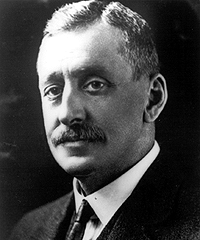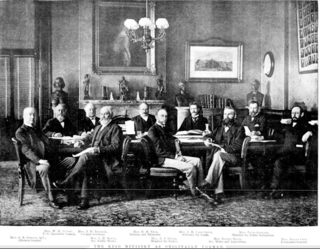Related Research Articles

John Joseph Cahill, also known as Joe Cahill or J. J. Cahill, was a long-serving New South Wales politician, railway worker, trade unionist and Labor Party Premier of New South Wales from 1952 to his death in 1959. Born the son of Irish migrants in Redfern, New South Wales, Cahill worked for the New South Wales Government Railways from the age of 16 before joining the Australian Labor Party. Being a prominent unionist organiser, including being dismissed for his role in the 1917 general strike, Cahill was eventually elected to the Parliament of New South Wales for St George in 1925.

James Squire Farnell was an Australian politician and Premier of New South Wales. Farnell was a hard-working legislator who gave much study to the land question and also tried hard for some years to pass a bill for the regulation of contagious diseases.

Major General James William Macarthur-Onslow, was a soldier, grazier and politician. The son of a prominent New South Wales family, he was commissioned in the New South Wales Mounted Rifles in 1892 and served in the Chitral Expedition, Second Boer War and the First World War. Afterwards he served in the New South Wales Legislative Assembly and New South Wales Legislative Council.

Edward William O'Sullivan was an Australian journalist and politician.
John Charles Lucas Fitzpatrick was an Australian politician and journalist.

Geoffrey Eagar was an accountant and colonial politician and civil servant in New South Wales, Australia.

Charles William Oakes was an Australian politician.
Joseph Michael Leary, was an Australian politician and solicitor, serving as a member of the New South Wales Legislative Assembly.

James Henry Young was an Australian colonial businessman and politician and Speaker of the New South Wales Legislative Assembly.

The Reid ministry was the 28th ministry of the Colony of New South Wales, and was led by the 12th Premier, George Reid. The title of Premier was widely used to refer to the Leader of Government, but was not a formal position in the government until 1920. Instead the Premier was appointed to another portfolio, usually Colonial Secretary but on this occasion Reid took the portfolio of Colonial Treasurer until July 1899 and then Attorney General.

The Postmaster-General of New South Wales was a position in the government of the colony of New South Wales. This portfolio managed the postal department of the New South Wales Government and was in charge of all postal and communications services in the colony prior to the Federation of Australia, from 1835 to 1901. Upon Federation, Section 51(v) of the Constitution of Australia gave the Commonwealth exclusive power for "postal, telegraphic, telephonic, and other like services".

Charles James Roberts, was a publican and politician in colonial New South Wales and Postmaster-General of New South Wales.

Jacob Garrard was a politician in colonial New South Wales, serving as Secretary for Public Works and Minister for Public Instruction.

Walter Hussey Vivian was an Australian politician.
A by-election was held for the New South Wales Legislative Assembly electorate of The Hastings on 4 July 1870 as a result of the Legislative Assembly declaring the election of Horace Dean was void. Dean had been appointed the postmaster at Tinonee at the time of the nominations for the 1869 election and resigned the following day. The Committee of Elections and Qualifications held that because he had an office of profit under the crown at the time of his nomination meant he was incapable of being elected, or of sitting, or voting, as a member of the Assembly.
The Hastings and Manning, an electoral district of the Legislative Assembly in the Australian state of New South Wales was created in 1880 and abolished in 1894.
The Hastings and The Macleay, an electoral district of the Legislative Assembly in the Australian state of New South Wales was created in 1894 and abolished in 1920.
A by-election was held for the New South Wales Legislative Assembly electorate of Hastings and Macleay on 1 March 1900 because Edmund Barton (Protectionist) resigned to travel to London with Alfred Deakin and Charles Kingston to explain the federation bill to the British Government. Francis Clarke was the former member who had resigned in 1898 to allow Barton to re-enter parliament.
A by-election was held for the New South Wales Legislative Assembly electorate of West Sydney on 26 July 1890 because of the death of Alfred Lamb.
A by-election was held for the New South Wales Legislative Assembly electorate of Namoi on 31 July 1890 because of the death of Tom Dangar.
References
- ↑ Rutledge, Martha. "Roberts, Charles James (1846–1925)". Australian Dictionary of Biography . Melbourne University Press. ISSN 1833-7538 . Retrieved 3 May 2021– via National Centre of Biography, Australian National University.
- ↑ "Mr Charles James Roberts (1846-1925)". Former Members of the Parliament of New South Wales . Retrieved 21 May 2019.
- ↑ "Writ of election: The Hastings and Manning". New South Wales Government Gazette (146). 14 March 1890. p. 2353. Retrieved 4 May 2021– via Trove.
- ↑ Green, Antony. "1890 Hastings and Manning by-election". New South Wales Election Results 1856-2007. Parliament of New South Wales . Retrieved 4 May 2021.